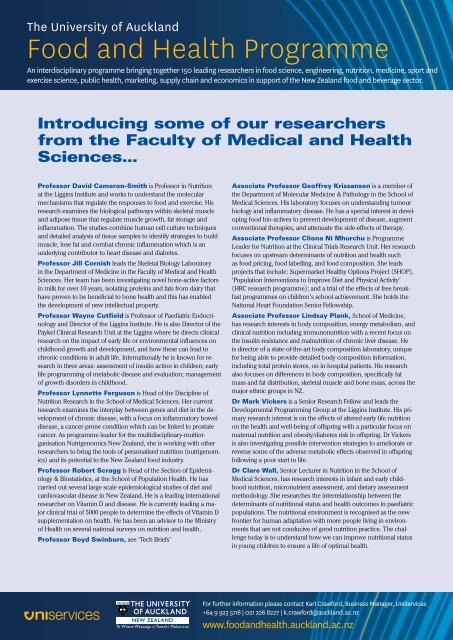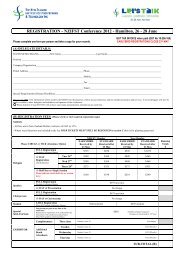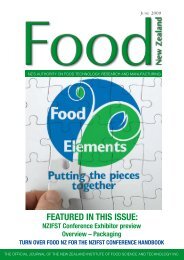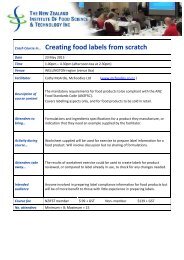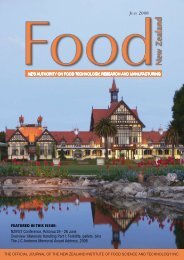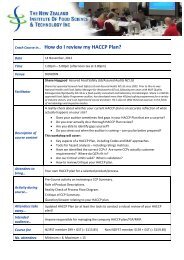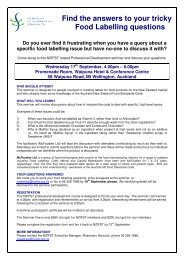FEATURED IN THIS ISSUE: - NZIFST - The New Zealand Institute of ...
FEATURED IN THIS ISSUE: - NZIFST - The New Zealand Institute of ...
FEATURED IN THIS ISSUE: - NZIFST - The New Zealand Institute of ...
Create successful ePaper yourself
Turn your PDF publications into a flip-book with our unique Google optimized e-Paper software.
<strong>The</strong> University <strong>of</strong> AucklandFood and Health ProgrammeAn interdisciplinary programme bringing together 150 leading researchers in food science, engineering, nutrition, medicine, sport andexercise science, public health, marketing, supply chain and economics in support <strong>of</strong> the <strong>New</strong> <strong>Zealand</strong> food and beverage sector.Introducing some <strong>of</strong> our researchersfrom the Faculty <strong>of</strong> Medical and HealthSciences…Pr<strong>of</strong>essor David Cameron-Smith is Pr<strong>of</strong>essor in Nutritionat the Liggins <strong>Institute</strong> and works to understand the molecularmechanisms that regulate the responses to food and exercise. Hisresearch examines the biological pathways within skeletal muscleand adipose tissue that regulate muscle growth, fat storage andinflammation. <strong>The</strong> studies combine human cell culture techniquesand detailed analysis <strong>of</strong> tissue samples to identify strategies to buildmuscle, lose fat and combat chronic inflammation which is anunderlying contributor to heart disease and diabetes.Pr<strong>of</strong>essor Jill Cornish leads the Skeletal Biology Laboratoryin the Department <strong>of</strong> Medicine in the Faculty <strong>of</strong> Medical and HealthSciences. Her team has been investigating novel bone-active factorsin milk for over 10 years, isolating proteins and fats from dairy thathave proven to be beneficial to bone health and this has enabledthe development <strong>of</strong> new intellectual property.Pr<strong>of</strong>essor Wayne Cutfield is Pr<strong>of</strong>essor <strong>of</strong> Paediatric Endocrinologyand Director <strong>of</strong> the Liggins <strong>Institute</strong>. He is also Director <strong>of</strong> thePaykel Clinical Research Unit at the Liggins where he directs clinicalresearch on the impact <strong>of</strong> early life or environmental influences onchildhood growth and development, and how these can lead tochronic conditions in adult life. Internationally he is known for researchin three areas: assessment <strong>of</strong> insulin action in children; earlylife programming <strong>of</strong> metabolic disease and evaluation; management<strong>of</strong> growth disorders in childhood.Pr<strong>of</strong>essor Lynnette Ferguson is Head <strong>of</strong> the Discipline <strong>of</strong>Nutrition Research in the School <strong>of</strong> Medical Sciences. Her currentresearch examines the interplay between genes and diet in the development<strong>of</strong> chronic disease, with a focus on inflammatory boweldisease, a cancer-prone condition which can be linked to prostatecancer. As programme leader for the multidisciplinary-multiorganisationNutrigenomics <strong>New</strong> <strong>Zealand</strong>, she is working with otherresearchers to bring the tools <strong>of</strong> personalised nutrition (nutrigenomics)and its potential to the <strong>New</strong> <strong>Zealand</strong> food industry.Pr<strong>of</strong>essor Robert Scragg is Head <strong>of</strong> the Section <strong>of</strong> Epidemiology& Biostatistics, at the School <strong>of</strong> Population Health. He hascarried out several large scale epidemiological studies <strong>of</strong> diet andcardiovascular disease in <strong>New</strong> <strong>Zealand</strong>. He is a leading internationalresearcher on Vitamin D and disease. He is currently leading a majorclinical trial <strong>of</strong> 5000 people to determine the effects <strong>of</strong> Vitamin Dsupplementation on health. He has been an advisor to the Ministry<strong>of</strong> Health on several national surveys on nutrition and health.Pr<strong>of</strong>essor Boyd Swinburn, see ‘Tech Briefs’Associate Pr<strong>of</strong>essor Ge<strong>of</strong>frey Krissansen is a member <strong>of</strong>the Department <strong>of</strong> Molecular Medicine & Pathology in the School <strong>of</strong>Medical Sciences. His laboratory focuses on understanding tumourbiology and inflammatory disease. He has a special interest in developingfood bio-actives to prevent development <strong>of</strong> disease, augmentconventional therapies, and attenuate the side-effects <strong>of</strong> therapy.Associate Pr<strong>of</strong>essor Cliona Ni Mhurchu is ProgrammeLeader for Nutrition at the Clinical Trials Research Unit. Her researchfocuses on upstream determinants <strong>of</strong> nutrition and health suchas food pricing, food labelling, and food composition. She leadsprojects that include: Supermarket Healthy Options Project (SHOP),‘Population Interventions to Improve Diet and Physical Activity’(HRC research programme); and a trial <strong>of</strong> the effects <strong>of</strong> free breakfastprogrammes on children’s school achievement. She holds theNational Heart Foundation Senior Fellowship.Associate Pr<strong>of</strong>essor Lindsay Plank, School <strong>of</strong> Medicine,has research interests in body composition, energy metabolism, andclinical nutrition including immunonutrition with a recent focus onthe insulin resistance and malnutrition <strong>of</strong> chronic liver disease. Heis director <strong>of</strong> a state-<strong>of</strong>-the-art body composition laboratory, uniquefor being able to provide detailed body composition information,including total protein stores, on in-hospital patients. His researchalso focuses on differences in body composition, specifically fatmass and fat distribution, skeletal muscle and bone mass, across themajor ethnic groups in NZ.Dr Mark Vickers is a Senior Research Fellow and leads theDevelopmental Programming Group at the Liggins <strong>Institute</strong>. His primaryresearch interest is on the effects <strong>of</strong> altered early life nutritionon the health and well-being <strong>of</strong> <strong>of</strong>fspring with a particular focus onmaternal nutrition and obesity/diabetes risk in <strong>of</strong>fspring. Dr Vickersis also investigating possible intervention strategies to ameliorate orreverse some <strong>of</strong> the adverse metabolic effects observed in <strong>of</strong>fspringfollowing a poor start to life.Dr Clare Wall, Senior Lecturer in Nutrition in the School <strong>of</strong>Medical Sciences, has research interests in infant and early childhoodnutrition, micronutrient assessment, and dietary assessmentmethodology. She researches the interrelationship between thedeterminants <strong>of</strong> nutritional status and health outcomes in paediatricpopulations. <strong>The</strong> nutritional environment is recognised as the newfrontier for human adaptation with more people living in environmentsthat are not conducive <strong>of</strong> good nutrition practice. <strong>The</strong> challengetoday is to understand how we can improve nutritional statusin young children to ensure a life <strong>of</strong> optimal health.For further information please contact Karl Crawford, Business Manager, UniServices+64 9 923 5118 | 021 226 8227 | k.crawford@auckland.ac.nzwww.foodandhealth.auckland.ac.nzDecember 2011/January 2012 17


